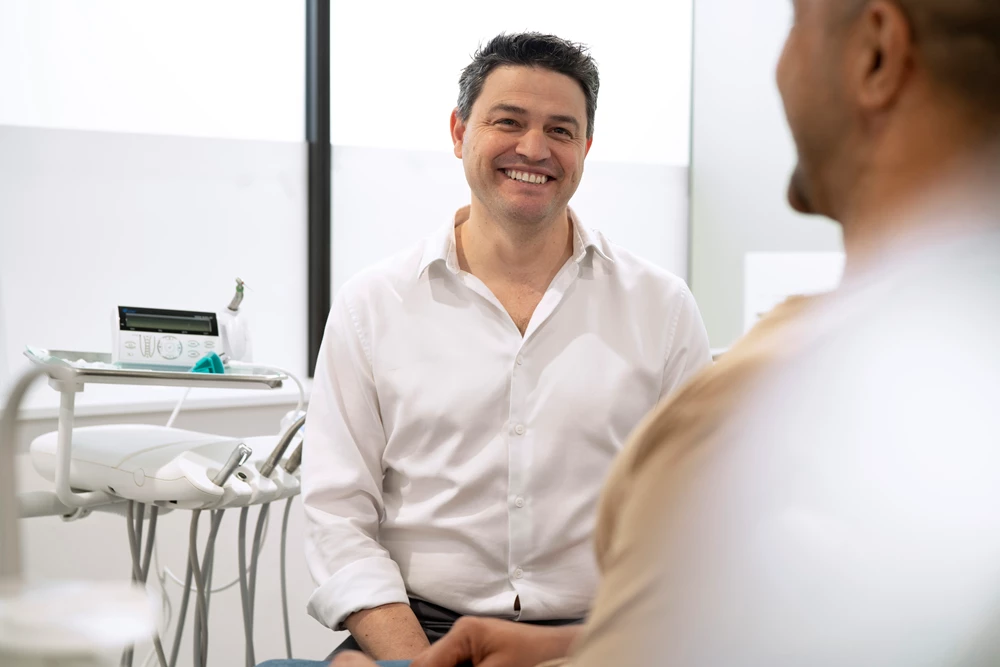- About us
- Dental Problems
Teeth & Gums
Cosmetic Improvement
Common Issues
- Treatments
Dental Services
Cosmetic Dental Services
Dental Specialists
- Before & After
- Patient Safety
- Contact
- Blog
-
Clinic Timing
12:00pm to 9:00pm
- About us
- Dental Problems
Teeth & Gums
Cosmetic Improvement
Common Issues
- Treatments
Dental Services
Cosmetic Dental Services
Dental Specialists
- Before & After
- Patient Safety
- Contact
- Blog
Treatments
Teeth Grinding Treatment in Lahore
Bruxism, or teeth grinding, is the act of clenching, grinding, or gnashing your teeth. It can range from barely bothersome to highly uncomfortable. Timely treatment may be necessary to prevent permanent damage. Awake bruxism occurs when you unknowingly clench your teeth while awake, while sleep bruxism happens during sleep. Minor teeth grinding may not require treatment, but prolonged grinding can lead to significant tooth damage. Long-term bruxism can result in migraines, jaw problems, tooth wear and fractures.
When to See a Dentist:
If in doubt, check it out.
Book an appointment to see a dentist as soon as possible if:
Book an appointment to see a dentist as soon as possible if:
- You have pain that lasts longer than a day or two
- Your pain is severe or starts to become unbearable
- You have a fever, earache or pain when you open your mouth wide
- You have chipped or loose teeth
- You are concerned about teeth clenching or grinding
Are you in pain?
Contact us immediately if you’re in pain and require emergency dental care. We’ll prioritise your urgent appointment to provide prompt assistance.

Symptoms of Teeth Grinding
If your condition is mild, you may not be aware that you are grinding your teeth. It might be that a friend or family member notices it first. Or perhaps symptoms of bruxism are seen by your dentist during a routine appointment. Some signs and symptoms that you may have bruxism include:
- Clenching or grinding your teeth, either awake or asleep
- Fractured or chipped teeth
- Tooth loss
- Flattened teeth or worn teeth and enamel, exposing deeper layers of your tooth
- Increased tooth pain or sensitive teeth
- Tired or tight jaw muscles, or a locked jaw that won’t open or close completely
- Pain or soreness in your jaw, neck, face or ears
- Headaches
- Damage from chewing on the inside of your cheek
- Disrupted sleep
Causes of Teeth Grinding
There are a number of reasons bruxism can occur. It’s sometimes caused by excess stress or anxiety. Heightened emotions such as anger, frustration or tension can also trigger it. Teeth grinding may also develop as a coping strategy during periods of concentration. If you have sleep bruxism, it is more likely to be caused by an abnormal bite, missing teeth, or crooked teeth. Or it might be due to a sleep disorder such as sleep apnoea. There are some risk factors that may increase your chance of developing bruxism. These include:
- Increased stress, anxiety or frustration
- Age-bruxism is common in young children and generally lessens by adulthood
- Personality type – being aggressive, competitive or hyperactive may increase your risk
- Medications – it may be an uncommon side effect of some medications including some antidepressants
- Family history – sleep bruxism often occurs in families
- Other disorders – bruxism can be associated with some mental health and medical disorders including Parkinson’s disease, dementia, gastroesophageal reflux disorder (GERD), epilepsy, night terrors, and sleep-related disorders such as sleep apnoea
Related Treatments
Your dentist will scrutinise your mouth to diagnose the cause of your pain or condition. You may need one of these standard treatments.
Get Prepared
When scheduling a check-up or treatment at our dental practices, efficiency is important. It’s beneficial to anticipate the information your dentist will require for diagnosis and treatment.
Typically, your dentist will inquire about your medical history and perform a comprehensive examination of your oral and facial areas. This includes the mouth, teeth, gums, jaw, tongue, throat, sinuses, ears, nose, and neck. Depending on the suspected cause of your issue, an X-ray may also be necessary.
Your dentist will ask you some questions about your teeth and any pain you may have, such as:
- Are you experiencing any pain?
- How severe is the pain?
- Where do you feel the pain?
- What is your regular dental routine?
- What is your diet like?
- What is your lifestyle like?
- Are you experiencing any extra stress?
- Do you suffer from anxiety?
Before your appointment, consider your responses to these questions. Being prepared can expedite the diagnosis.
FAQs
01. How much does it cost to treat bruxism?
The cost of evaluating and treating bruxism varies based on the underlying issues and causes. As teeth grinding (bruxism) can indicate a potentially serious problem, we recommend seeking a dental assessment. Your dentist will diagnose the cause and provide guidance on treatment expenses. When scheduling online, choose an appointment specifically for teeth grinding.
02. Is teeth grinding common?
Bruxism, also referred to as teeth clenching or grinding, is a prevalent issue among individuals, including young children. It often occurs during the night when new teeth are emerging, but typically resolves by adulthood. Although less common in adults, rest assured that bruxism can be managed. Don’t hesitate to discuss your concerns with your dentist for further guidance.
03. What causes teeth grinding?
Bruxism, the clenching or grinding of teeth, can result from various factors. It might be linked to lifestyle choices, stress, anxiety, intense emotions, or prolonged focus. Family history can also play a role, as can certain medications or substances. Furthermore, bruxism can be associated with oral conditions like an abnormal bite, tooth loss, or misaligned teeth.
04. How can I stop grinding my teeth?
The treatment for your bruxism depends on its underlying cause. If stress is a factor, your dentist might suggest counseling, psychotherapy, or relaxation techniques. Muscle relaxants could be prescribed to alleviate jaw spasms, or a custom-made bite plate may be recommended. In certain instances, your dentist may refer you to a general practitioner or oral surgeon.
05. How do you treat bruxism caused by tooth problems?
If you’ve developed teeth grinding or bruxism due to problems with your teeth, your dentist may recommend that you correct your tooth alignment. Your dentist may want to discuss treatment to reshape the biting surfaces of your teeth. They may also suggest a custom-made mouthguard to prevent further damage to your teeth and to promote better alignment.
06. I’m anxious about visiting the dentist.
We understand. Fear of the dentist is often due to negative past experiences. Rest assured; our caring and empathetic dentists sympathize with your emotions. It is important to communicate your concerns, whether anxiety, fear of pain, or worries about the cost. Ensuring your comfort is a priority for us.
07. Can bruxism be prevented?
Managing teeth clenching or grinding involves lifestyle changes. Stress management, mindfulness, and improved sleep routines can help with mild bruxism. If your bruxism is related to oral or dental conditions, it’s recommended to see your dentist. To maintain oral health, combine good at-home dental care with regular dental visits. Follow these daily habits:
- Brush your teeth twice daily and floss once daily for proper oral hygiene.
- Schedule biannual hygiene visits with an oral hygienist or oral health therapist.
- Schedule an annual exam and x-rays with your dentist.

